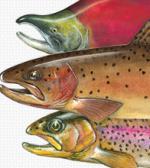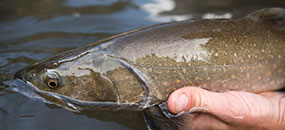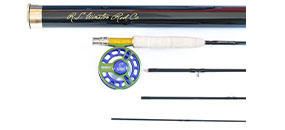Each month we will share an interview with a local fly fisherman that has done many things for the sport.
This month we highlight Starr Nolan. Owner of Brookside Guides, Executive director for Casting Carolinas, and 2017 inductee into the Southern Appalachian Fly Fishing Museum’s Hall of Fame.
Links to Casting Carolinas Website and Facebook page at the bottom.
TU640: Tell us about how you got started fly fishing.
Starr: My first fly fishing experience was on a flats boat off of Big Pine Key. I have a history of starting everything from “most difficult possible”, but the experience got me really interested in fly fishing. The friend I was fishing with offered to buy me a set up for fishing in western NC and right after that I won a 3-day guided trip in the Smokies in a TU raffle. Hooked!
TU640: What do you love the most about fly fishing?
Starr: The sound of the water… the sensation of standing in moving water… and that no matter how much you learn, you never get it... because the river, the fish and the insects are constantly changing.
TU640: What is your favorite species of trout and why?
Starr: Wild brookies… because of their strength and enthusiasm.
TU640: How long have you been fly fishing/guiding?
Starr: 24 years
TU640: What area of the country do you operate out of?
Starr: Western NC
TU640: Being a female were there any obstacles to overcome when you first started guiding?
Starr: I encountered a few male anglers who were doubtful but for the most part I found clients to be enthusiastic and interested. It’s the fly-fishing world in general that has not been fully receptive and responsive to women. Look at the gear, for example, that’s offered for women vs. what’s offered for men.
TU640: Do you face any prejudices as a female guide?
Starr: Of course. Try walking into a fly shop and being taken seriously. I’ve done that many times and been mostly ignored. At Casting Carolinas retreats we give the women a script for how to be taken seriously in a fly shop: “I’ve been in the market for a 5 wt. that has a little faster action... What do you have that I can try?” etc. That usually gets them noticed and taken seriously.
TU640: What motivates you to be a great guide and fly fisher?
Starr: I don’t strive to be great. I just try to be kind, enthusiastic, an effective teacher and a good learner. Those are life values that inform everything I do.
TU640: Why is Fly Fishing a great sport for women?
Starr: Because it’s a great sport for anyone. Being outdoors, part of the water, exploring and being curious about the natural world… learning patience, persistence… to keep trying, changing things up… all those are great experiences and life skills. Success at fly fishing (or at anything) builds confidence. Fly fishing success may mean more to women because it has been identified as a male sport… something that women can’t do. And women are almost always better at casting and at fly fishing because they listen to instruction and understand that mistakes and failures are part of learning.
TU640: What are your thoughts on the industry’s response to the growth of women in fly fishing?
Starr: Some response but still nowhere close to catching up. Look at the major retailers like Simms, for example. There are a couple of wader choices for women… more for male anglers, etc. And they tend to make women’s fishing shirts just in pastels and all those colors that we teach serious anglers not to wear… which to me is a message that female anglers are still not taken seriously. I saw a company that was advertising these great trout sandals with the usual fish patterns. The smallest size available in men’s was 7-8. One style for women… pastel! I wrote to them…where are the cool shoes for women anglers? Do you have any words of advice for a female audience who wants to spend more time outdoors this year? Do it. Don’t wait.
TU640: Do you have any words of advice for a female audience who wants to spend more time outdoors this year?
Starr: Do it. Don’t wait.
TU640: We know that you are passionate about fishing, but could you speak about Casting Carolinas and what makes the organization so special?
Starr: Our free retreats for women surviving all types of cancer are about much more than fly fishing. I developed our F.L.O.W. model which is unique to Casting Carolinas. F.L.O.W. is a mindfulness practice that helps women deal more effectively with the emotional challenges of life after cancer diagnosis/treatment. So, we teach fly fishing... definitely a mindful sport... that puts women outdoors, in the water… And we teach them to F.L.O.W. as they’re fishing... or in any other situation. They practice breathing, noticing, feeling, and checking to make sure they’re ‘on value” rather than hooked in some unhelpful stories. Over 300 women have attended… and we’ve gotten rave reviews. Some women say our retreats are “life changing.” That’s what Casting Carolinas is about: Helping women thrive after cancer.
TU640: What did it feel like when you were inducted into the Southern Appalachian Fly-Fishing Museum’s Hall of Fame?
Starr: Humbling. As I said in my “acceptance speech,” I felt like I was accepting the award on behalf of so many people who have supported me and Casting Carolinas. I said…and I sincerely meant it ...that everyone in the room and a whole lot more people were on the stage accepting the award with me.
TU640: Who has been your greatest inspiration in your fly-fishing journey?
Starr: Women like Wanda Taylor, Jean Williams Bruun in Wyoming, Charity Rutter, Simons Welter… who have made their way in the fly-fishing world and largely been accepted for the excellent anglers and teachers that they are.
TU640: As a guide what does your average day look like?
Starr:Honestly, I don’t get on the water as much as I once did. When I was out there most days, they were like every other guide’s day… meet some new folks and get a sense of what they want the trip to look like… be totally supportive and helpful… listen… help them appreciate the river, the fish… take good care of them and try to create a safe, fun experience.
TU640: Where do you most love to fly fish?
Starr: Anywhere I happen to be fishing.
TU640: Give me a life lesson you have learned from fly fishing?
Starr: Patience and generosity are important values. Learn from successes and mistakes… and then just cast again.
TU640: As somebody who loves to be surrounded by nature, have you noticed any environmental decline in recent years?
Starr: I am still sad about the Hemlocks and the damaging effects of their decline. I floated the Watauga last weekend during some heavy thunderstorms… and saw so much run off from the farms and property on the river. Pure mud running into the river. Water temps much warmer than usual… which of course is stressful to the fish.
TU640: What impact do you think organizations like Trout Unlimited have had on angling? What are their greatest contributions and what issues should they focus on for the future?
Starr: I think one of the greatest achievements of TU is the recognition of how important it is to educate people about conservation and get them invested in the health of the water… beginning with kids. Trout in the Classroom and the Kids fishing camps are great examples of how important it is to get kids onboard early with environmental health.
TU640: Can you tell us about your musical talents and how long you’ve been doing that?
Starr: I started playing piano when I was 6 years old. I majored in classical piano in my first years in undergrad then decided that world wasn’t resonating for me. After I graduated from UNC CH grad school, I rewarded myself (over 30 years ago) by signing up for fiddle lessons at Warren Wilson college. I’ve been playing fiddle and mandolin and singing with my group since then.
TU640: How do you want to be remembered?
Starr: As someone who cared and tried to help make life better for other people and our beautiful planet.




